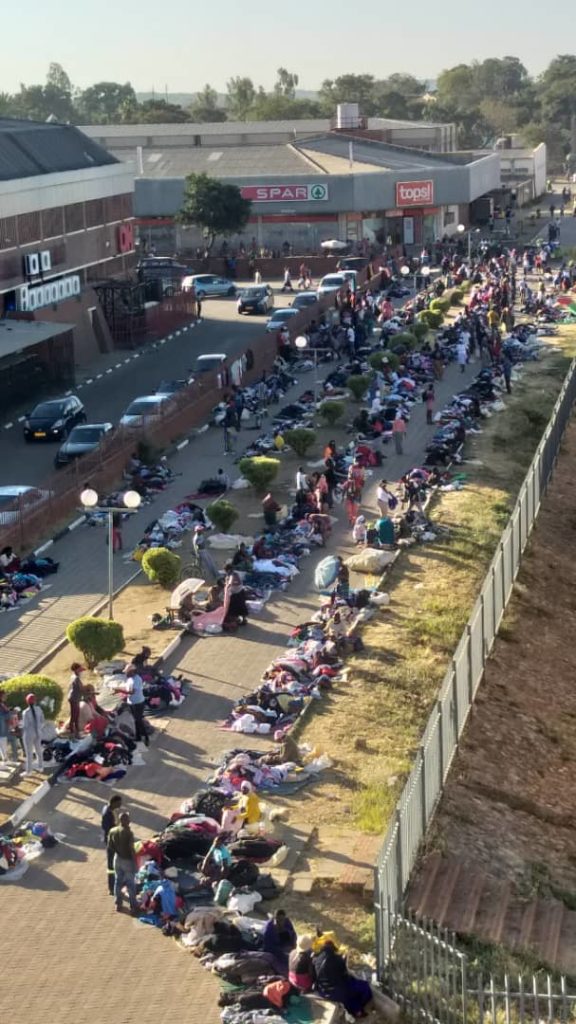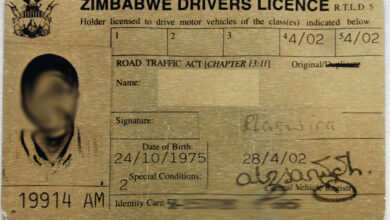
With heavy vehicular traffic flowing into Kwekwe’s central business district (CBD), it is hard to tell that the city is under lockdown.
Mshikashikas (illegal private commuter omnibuses and taxis) jostling to ferry residents to and from the CBD and causing confusion within the city’s already roads, one can be forgiven for concluding that everything is normal in the city.
Worryingly, the mshikashika’s are operating despite the roadblocks mounted along the main roads leading to the city.
While in the CBD its business-as-usual with supermarkets, flea markets, grocery and clothing shops operating normally despite having to close earlier due to the curfew.

It was always going to be difficult for authorities to enforce a localised lockdown, the first of its kind in the country, which also came with a curfew order of 7 pm to 5 am.
The government last week put Kwekwe under a localised two-week lockdown to avert the spread of the deadly B.1.617.2 Covid-19 variant which was recently detected in the mining town.
This follows the death of businessman Robson Kadenhe (76), with tests later revealing that he had succumbed to the Indian variant of the pandemic.
Three of the late Kadenhe’s family members have since tested positive to the virus and are under quarantine.
Four others including the nurse who attended to the late Kadenhe also tested positive and are under the watchful eye of the local health authorities.
The government, acting on recommendations from the district Civil Protection Unit findings, pushed the panic button and slapped the mining town with the lockdown.
But what the government completely disregarded was the implementation part.
Part of lockdown recommendations includes the immediate ban of weddings, church services and other public and private gatherings.
While, for fear of the unknown, most churches were closed on Sunday, some chose to defy the lockdown and went on to hold church services.
Night clubs and bars continue to operate in total defiance of the curfew.
A section of the residents is also arguing the reason behind the lockdown saying if the cases were under control, there was no need to lock down the city.
“We are told that the cases are under control and since those ones were detected, no one else tested positive in Kwekwe. We need to survive and we survive on selling wares on the streets and surely we cannot stay at home because of two people,” said Thabani Sibanda, a vegetable vendor from Mbizo.
Lack of information seems to be taking its toll on the Kwekwe residents as most of them seem not to know what to do and what not to do.
Chairperson of the Kwekwe District Taskforce on Covid-19 who is also the district’s District Development Coordinator, Fortune Mpungu agrees that information dissemination is poor.
“Our risk communication teams are on the ground doing awareness campaigns in respect of social distance, sanitization and temperature checks. I am sure as we intensify our containment of covid-19 to measure the community will comply, Although ZRP is in the best position to answer on complying, I think people will always devise ways of evading arrest,” said Mpungu.
Despite stating that the cases were under control, Mpungu told the Kwekwe Press Club that contact tracing was still ongoing.
“The Indian variant was discovered in Kwekwe. If it becomes imperative that as we intensify our case investigation and contract tracing, we should take measures to ensure that the virus is not transported to other areas hence the localized lockdown. Contract tracing is ongoing and once the virus is detected, in other areas I am sure more containment measures will be instituted,” said Mpungu.
Questions have also been raised on how the Indian variant reached Kwekwe after emerged that the local resident who recently returned from India had tested negative to the virus despite numerous tests.
Former Health Minister Dr Henry Madzorera also told the Kwekwe Press Club that the country lacked proper testing methods hence they might have been misled.
Upon her return, she got tested and results came out negative and she was released.
“Do not rely too much on these tests. Obviously, the girl is the one who brought the virus because our methods of testing are not that accurate. Antigen tests are not always accurate as they are 80 percent correct. We do not have any better ways of testing for the virus except PCR tests which are also about 90 percent accurate,” said Dr Madzorera.
He also dismissed the notion that the girl had been vaccinated hence she could not test positive.
“Even if you are vaccinated, the virus will attack you. That cannot be the reason why it was not detected on the girl,” said Dr Madzorera.
As the authorities struggle to enforce the localized lockdown, it remains to be seen whether the lockdown will achieve desired results.






